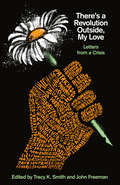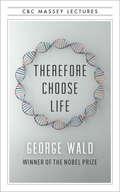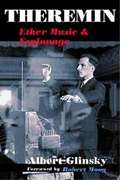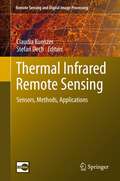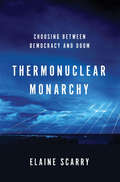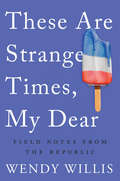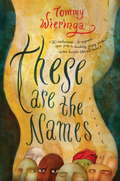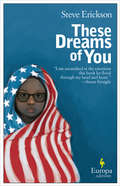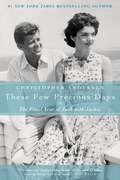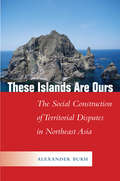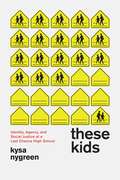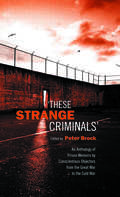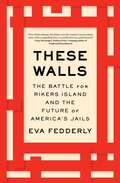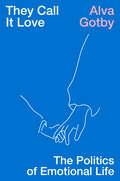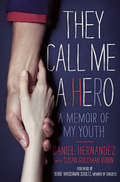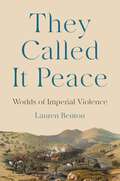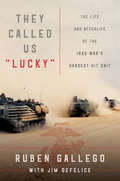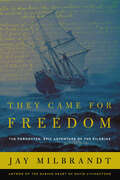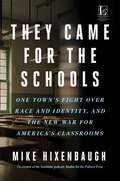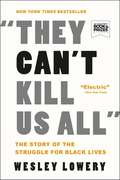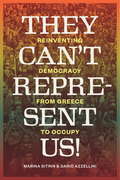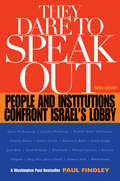- Table View
- List View
There's Nothing in the Middle of the Road but Yellow Stripes and Dead Armadillos: A Work of Political Subversion
by Jim HightowerThere's Nothing in the Middle of the Road But Yellow Stripes and Dead Armadillos is a lucid, viciously funny, downright refreshing look at the mess we're in and how we got there. It argues that government (both of the left and the right) and big business are inextricably committed to protecting each other's economic and political interests. In the bargain, of course, the common people get steamrolled. Hightower shows why neither Republicans nor Democrats have ever seriously addressed the needs of the disenfranchised.aBut Hightower is no whiner-he offers populist, grassroots solutions to the problems he sees. He demonstrates how the poor-and now the middle-class-represents a true populist majority that has channeled its anger into grassroots organizing that is already making a difference at the local level. From who really runs Washington to fixing the environment, from laying bare the dirty politics behind the new global economy to the malevolent manipulations of cyberspace, Hightower leaves no contemporary issues unscathed. There's Nothing in the Middle of the Road But Yellow Stripes and Dead Armadillos is sure to evoke heated opinions from all parts of the political spectrum, and to generate much critical discussion.
There's a Revolution Outside, My Love: Letters from a Crisis
by John Freeman Tracy K. SmithThis kaleidoscopic portrait of an unprecedented time brings together some of our most treasured writers today—Edwidge Danticat, Layli Long Soldier, Monica Youn, Julia Alvarez, Reginald Dwayne Betts, Keeanga-Yamahtta Taylor—to give voice to the unthinkable grief and hopeful possibilities born in an era of revolution and change.&“A maelstrom of grief, anger, fear and confusion, with glimmers of gratitude and hope: a comprehensive emotional document of a moment.&”—New York Times Book Review Now is an extraordinary time. Across the country, people are losing their loved ones, their livelihoods, their homes, and even their own lives to COVID-19. Despite the pandemic, countless protests erupted this summer over the recurring loss of Black lives. Reverberations of shock and outrage remain with us all. There's a Revolution Outside, My Love captures and articulates all of these roiling sentiments unleashed by a profound national reckoning. Drawing its title from a powerful letter to her son by Kirsten West Savali, the book fans out from there, offering a rich and intimate view of the change we underwent. Composed of searing letters, essays, poems, reflections, and screeds, There's a Revolution Outside, My Love highlights the work of some of our most powerful and insightful writers who hail from across a range of backgrounds and from almost all fifty states. Among them, these writers have brought home four Pulitzers, two National Book Awards, a fistful of Whitings, and numerous citations in best American poetry, short story, and essay compilations. They are noisy with beauty, and their pieces ring louder and clearer than ever before. Galvanizing and lyrical, this is a deeply profound anthology of writing filled with pain and beauty, warmth and intimacy. A remarkable feat of empathy, There's a Revolution Outside, My Love offers solace in a time of swirling protest, change, and violence—reminding us of the human scale of the upheaval, and providing hope for a kinder future.
Therefore Choose Life: The Found Massey Lectures (The CBC Massey Lectures)
by George WaldThis recently discovered and very timely 1970 Massey Lectures by Nobel Prize-winning scientist George Wald, now in print for the first time ever.Where did we come from, who are we, and what is to become of us — these questions have never been more urgent. Then, as now, the world is facing major political and social upheaval, from overpopulation to nuclear warfare to environmental degradation and the uses and abuses of technology. Using scientific fact as metaphor, Nobel Prize–winning scientist George Wald meditates on our place, and role, on Earth and in the universe. He urges us to therefore choose life — to invest in our capabilities as human beings, to heed the warnings of our own self-destruction, and above all to honour our humanity.
Theremin: Ether Music and Espionage
by Albert Glinsky Robert MoogLeon Theremin led a life of flamboyant musical invention laced with daring electronic stealth. A creative genius and prolific inventor, Theremin launched the field of electronic music virtually singlehandedly in 1920 with the musical instrument that bears his name. The theremin--the only instrument that is played without being touched--created a sensation worldwide and paved the way for the modern synthesizer. Its otherworldly sound became familiar in sci-fi films and even in rock music. This magical instrument that charmed millions, however, is only the beginning of the story. As a Soviet scientist, Theremin surrendered his life and work to the service of State espionage. On assignment in Depression-era America, he became the toast of New York society and worked the engines of capitalist commerce while passing data on U. S. industrial technology to the Soviet apparatus. Following his sudden disappearance from New York in 1938, Theremin was exiled to a Siberian labor camp and subsequently vanished into the top-secret Soviet intelligence machine, presumed dead for nearly thirty years. Throughout his life, Theremin developed many other electronic wonders, including one of the earliest televisions and multimedia devices that anticipated performance art and virtual reality by decades. In this first full biography of Leon Theremin, Albert Glinsky depicts the inventor's nearly one hundred-year life span as a microcosm of the twentieth century. Theremin is seen at the epicenter of most of the major events of the century: the Russian Revolution, two world wars, America's Great Depression, Stalin's purges, the cold war, and perestroika. His life emerges as no less than a metaphor for the divergence of communism and capitalism. Theremin blends the whimsical and the treacherous into a chronicle that takes in everything from the KGB to Macy's store windows, Alcatraz to the Beach Boys, Hollywood thrillers to the United Nations, Joseph Stalin to Shirley Temple. loyalties, mixed motivations, and an irrepressibly creative spirit.
Thermal Infrared Remote Sensing
by Claudia Kuenzer Stefan DechThis book provides a comprehensive overview of the state of the art in the field of thermal infrared remote sensing. Temperature is one of the most important physical environmental variables monitored by earth observing remote sensing systems. Temperature ranges define the boundaries of habitats on our planet. Thermal hazards endanger our resources and well-being. In this book renowned international experts have contributed chapters on currently available thermal sensors as well as innovative plans for future missions. Further chapters discuss the underlying physics and image processing techniques for analyzing thermal data. Ground-breaking chapters on applications present a wide variety of case studies leading to a deepened understanding of land and sea surface temperature dynamics, urban heat island effects, forest fires, volcanic eruption precursors, underground coal fires, geothermal systems, soil moisture variability, and temperature-based mineral discrimination. 'Thermal Infrared Remote Sensing: Sensors, Methods, Applications' is unique because of the large field it spans, the potentials it reveals, and the detail it provides. This book is an indispensable volume for scientists, lecturers, and decision makers interested in thermal infrared technology, methods, and applications.
Thermonuclear Monarchy: Choosing Between Democracy and Doom
by Elaine ScarryFrom one of our leading social thinkers, a compelling case for the elimination of nuclear weapons. During his impeachment proceedings, Richard Nixon boasted, "I can go into my office and pick up the telephone and in twenty-five minutes seventy million people will be dead." Nixon was accurately describing not only his own power but also the power of every American president in the nuclear age. Presidents Eisenhower, Kennedy, Johnson, and Nixon each contemplated using nuclear weapons--Eisenhower twice, Kennedy three times, Johnson once, Nixon four times. Whether later presidents, from Ford to Obama, considered using them we will learn only once their national security papers are released. In this incisive, masterfully argued new book, award-winning social theorist Elaine Scarry demonstrates that the power of one leader to obliterate millions of people with a nuclear weapon--a possibility that remains very real even in the wake of the Cold War--deeply violates our constitutional rights, undermines the social contract, and is fundamentally at odds with the deliberative principles of democracy. According to the Constitution, the decision to go to war requires rigorous testing by both Congress and the citizenry; when a leader can single-handedly decide to deploy a nuclear weapon, we live in a state of "thermonuclear monarchy," not democracy. The danger of nuclear weapons comes from potential accidents or acquisition by terrorists, hackers, or rogue countries. But the gravest danger comes from the mistaken idea that there exists some case compatible with legitimate governance. There can be no such case. Thermonuclear Monarchy shows the deformation of governance that occurs when a country gains nuclear weapons. In bold and lucid prose, Thermonuclear Monarchy identifies the tools that will enable us to eliminate nuclear weapons and bring the decision for war back into the hands of Congress and the people. Only by doing so can we secure the safety of home populations, foreign populations, and the earth itself.
These Are Strange Times, My Dear: Field Notes from the Republic
by Wendy Willis"In these pointed and wide–ranging essays, Wendy Willis explores everything from personal resistance to the rise of political podcasts, civic loneliness to the exploitation of personal data, public outrage to the opioid crisis—all with a poet's gift for finding the sacred in the mundane, a hope in the dark.One of the country's sharpest observers of politics, art, and the American spirit, Willis returns often to the demanding question posed by Czech writer, activist, and politician Václav Havel: What does it mean to live in truth? Her view is honed by her place as a poet, as a mother, and, when necessary, as an activist. Together, the essays in These Are Strange Times, My Dear work within that largely unmapped place where the heartbreaks and uncertainties of one's inner life brush up against the cruelties and responsibilities of politics and government and our daily lives."
These Are the Names
by Tommy WieringaA moody, atmospheric literary thriller and "a timeless tale of migration" (The Guardian), from one of Europe's biggest-selling authors Despite its Biblical title--which comes from the opening lines of the Book of Exodus--award-winning novelist Tommy Wieringa has crafted perhaps his most timely book yet, as he traces two stories doomed to collide. In one, we follow a group of starving, near-feral Eurasian refugees on a harrowing quest for survival; in the other, we follow Pontus Beg, a policeman from a small border town on the steppe, as he investigates the death of a rabbi, one of the town's two remaining Jews. What follows is a gripping saga in which the two stories race toward each other, and Beg will be shaken to his core by what each one reveals about man's dark nature, and the possibility--or impossibility--of his own redemption. A virtual parable for our times, These Are the Names offers a suspenseful reading of a crisis that continues to dominate headlines, and simultaneously explores the enduring questions of faith, identity, and what it means to be "home."
These Dreams of You
by Steve Erickson&“Set against the backdrop of Obama&’s ascendancy to the presidency . . . A complex and imaginative literary tapestry about family and identity&” (Kirkus Reviews, starred review). At once immediate and epic, funny and devastating, this new novel by the author of Shadowbahn is a transcendent dispatch from the intersection of art and politics, passion and memory. One November night in a canyon outside Los Angeles, Zan Nordhoc—a failed novelist turned pirate radio DJ—sits before the television with his small, adopted black daughter, watching the election of his country&’s first black president, Barack Obama. In the nova of this historic moment, with an economic recession threatening their home, Zan, his wife, and their son set out to solve the enigma of the little girl&’s life. When they find themselves scattered and strewn across two continents, a mysterious stranger with a secret appears, who sends the story spiraling forty years into the past. Sweeping from 1960s London and &’70s Berlin to twenty-first-century California, and the beginning-of-civilization Ethiopia, These Dreams of You chronicles not only a family struggling to salvage its bonds but a twelve-year-old boy readying himself for what the years to come hold. &“Truly electrifying. In its gorgeous, vivid prose and its acutely sensitive soul, These Dreams of You shows us just what a novel can still do in our own crazy times.&” —The Boston Globe &“Drama filled with exuberance.&” —The Washington Post &“The four Nordhocs who provide the messy, vibrant heart of These Dreams of You make up a representative tableau for the new millennium: the American family as mash-up.&” —The New York Times Book Review
These Few Precious Days: The Final Year of Jack with Jackie
by Christopher Andersen#1 New York Times bestselling biographer &“Christopher Andersen has a real track record when it comes to celebrity bios.…He looks at Jack and Jackie Kennedy during their final year, pondering aloud whether after all the triumphs and betrayals they still loved each other&” (Library Journal).They were the original power couple—outlandishly rich, impossibly attractive, and endlessly fascinating. Now, in this rare, behind-the-scenes portrait of the Kennedys in their final year together, New York Times bestselling biographer Christopher Andersen shows us a side of JFK and Jackie that we&’ve never seen before. Tender, intimate, complex, and, at times, explosive, theirs is a love story unlike any other—filled with secrets, scandals, and bombshells that could never be fully revealed until now.
These Islands Are Ours: The Social Construction of Territorial Disputes in Northeast Asia (Studies in Asian Security)
by Alexander BukhTerritorial disputes are one of the main sources of tension in Northeast Asia. Escalation in such conflicts often stems from a widely shared public perception that the territory in question is of the utmost importance to the nation. While that's frequently not true in economic, military, or political terms, citizens' groups and other domestic actors throughout the region have mounted sustained campaigns to protect or recover disputed islands. Quite often, these campaigns have wide-ranging domestic and international consequences. Why and how do territorial disputes that at one point mattered little, become salient? Focusing on non-state actors rather than political elites, Alexander Bukh explains how and why apparently inconsequential territories become central to national discourse in Japan, South Korea, and Taiwan. These Islands Are Ours challenges the conventional wisdom that disputes-related campaigns originate in the desire to protect national territory and traces their roots to times of crisis in the respective societies. This book gives us a new way to understand the nature of territorial disputes and how they inform national identities by exploring the processes of their social construction, and amplification.
These Kids: Identity, Agency, and Social Justice at a Last Chance High School
by Kysa NygreenFew would deny that getting ahead is a legitimate goal of learning, but the phrase implies a cruel hierarchy: a student does not simply get ahead, but gets ahead of others. In These Kids, Kysa Nygreen turns a critical eye on this paradox. Offering the voices and viewpoints of students at a “last chance” high school in California, she tells the story of students who have, in fact, been left behind. Detailing a youth-led participatory action research project that she coordinated, Nygreen uncovers deep barriers to educational success that are embedded within educational discourse itself. Struggling students internalize descriptions of themselves as “at risk,” “low achieving,” or “troubled”—and by adopting the very language of educators, they also adopt its constraints and presumption of failure. Showing how current educational discourse does not, ultimately, provide an adequate vision of change for students at the bottom of the educational hierarchy, she levies a powerful argument that social justice in education is impossible today precisely because of how we talk about it.
These Schools Belong to You and Me: Why We Can't Afford to Abandon Our Public Schools
by Deborah Meier Emily GasoiA challenge to narrow, profit-driven conceptions of school success and an argument for protecting public education to ensure that all students become competent citizens in a vibrant democracyIn These Schools Belong to You and Me, MacArthur award–winning educator, reformer, and author Deborah Meier draws on her fifty-plus years of experience to argue that the purpose of universal education is to provide young people with an “apprenticeship for citizenship in a democracy.” Through an intergenerational exchange with her former colleague and fellow educator Emily Gasoi, the coauthors analyze the last several decades of education reform, challenging narrow profit-driven conceptions of school success. Reflecting on the trajectory of education and social policies that are leading our country further from rule “of, for, and by the people,” the authors apply their extensive knowledge and years of research to address the question of how public education must change in order to counter the erosion of democratic spirit and practice in schools and in the nation as a whole. Meier and Gasoi candidly reflect on the successes, missteps, and challenges they experienced working in democratically governed schools, demonstrating that it is possible to provide an enriched education to all students, not just the privileged few. Arguing that public education and democracy are inextricably bound, and pushing against the tide of privatization, These Schools Belong to You and Me is a rousing call to both save and improve public schools to ensure that all students are empowered to help shape our future democracy.
These Strange Criminals
by Peter BrockIn many modern wars, there have been those who have chosen not to fight. Be it for religious or moral reasons, some men and women have found no justification for breaking their conscientious objection to violence. In many cases, this objection has led to severe punishment at the hands of their own governments, usually lengthy prison terms. Peter Brock brings the voices of imprisoned conscientious objectors to the fore in These Strange Criminals.This important and thought-provoking anthology consists of thirty prison memoirs by conscientious objectors to military service, drawn from the United Kingdom, the United States, Canada, Australia, and New Zealand, and centring on their jail experiences either during the first or second world wars or in Cold War America. Voices from history - like those of Stephen Hobhouse, Dame Kathleen Lonsdale, Ian Hamilton, Alfred Hassler, and Donald Wetzel - come alive, detailing the impact of prison life and offering unique perspectives on wartime government policies of conscription and imprisonment. Sometimes intensely moving, and often inspiring, these memoirs show that in some cases, individual conscientious objectors - many well-educated and politically aware - sought to reform the penal system from within either by publicizing its dysfunction or through further resistance to authority. The collection is an essential contribution to our understanding of criminology and the history of pacifism, and represents a valuable addition to prison literature.
These Walls: The Battle for Rikers Island and the Future of America's Jails
by Eva Fedderly&“These Walls reframes the debate the country's incarceration crisis, with a compelling focus on architecture as a path forward.&” ?Tony Messenger, Pulitzer Prize-winning author of Profit and Punishment &“A critical intervention in the high stakes debate about the social value of jails and what we could do instead to create safety and justice." ?Alex Vitale, author of The End of PolicingFor nearly a century, the Rikers Island jail complex has stood on a 413-acre man-made island in the East River of New York. Today it is the largest correctional facility in the city, housing eight active jails and thousands of incarcerated individuals who have not yet been tried. It is also one of the most controversial and notorious jails in America. Which is why, when mayor Bill de Blasio announced in 2017 that Rikers would be closed within the next decade, replaced with four newly designed jails located within the city boroughs, the surface reaction seemed largely positive. Not only would Rikers, a long-standing symbol of the ills of mass incarceration, be decommissioned, but the buildings erected in its place would be the product of more enlightened views and outlooks. Many were enthusiastic, including Eva Fedderly, a journalist focused on the intersections of social justice and design, who was covering the closure and its impact for Architectural Digest. In a world of the rhetoric of talking heads and empty political promises, here, finally, was action. Breaking down the structures that enable an unjust system would surely mean its eventual eradication—change. Wasn&’t that a sign of progress? As Fedderly dug deeper and spoke to more people involved, however, she discovered that the consensus was hardly universal. Among architects at megafirms tasked with redesigns that reconcile profits and progress, the members of law enforcement working to stop incarceration cycles in community hot spots, the reformers and abolitionists calling for change, and, most wrenchingly, the incarcerated and formerly incarcerated individuals whose lives will be most affected, some agreed that closing Rikers was a step in the right direction, but many were quick to point out that Rikers was being replaced, not removed. There was frustration that the presence of new jails would disrupt neighborhoods, and that the city&’s resources should be invested in effective crime prevention and rehabilitation in communities to stop the incarceration cycle. On one point, however, there was firm agreement: whatever the outcome, the world would be watching. Part on-the-ground reporting, part deep social and architectural history, These Walls is an eye-opening look into how systems of inequity are constructed and a challenge to our long-held beliefs about what constitutes power and justice.
They Cage the Animals At Night: The True Story of a Child Who Learned to Survive
by Jennings Michael BurchAn autobiography of a boy who learned to reach out for love despite being left in an orphanage and growing up in many foster homes.
They Call It Love: The Politics of Emotional Life
by Alva GotbyThe work of love is a feminist problem, and it demands feminist solutions Comforting a family member or friend, soothing children, providing company for the elderly, ensuring that people feel well enough to work; this is all essential labour. Without it, capitalism would cease to function. They Call It Love investigates the work that makes a haven in a heartless world, examining who performs this labor, how it is organised, and how it might change. In this groundbreaking book, Alva Gotby calls this work &“emotional reproduction,&” unveiling its inherently political nature. It not only ensures people&’s well-being but creates sentimental attachments to social hierarchy and the status quo. Drawing on the thought of the feminist movement Wages for Housework, Gotby demonstrates that emotion is a key element of capitalist reproduction. To improve the way we relate to one another will require a radical restructuring of society.
They Call Me a Hero
by Susan Goldman Rubin Daniel HernandezDaniel Hernandez helped save the life of Congresswoman Gabrielle Giffords, and his life experience is a source of true inspiration in this heartfelt memoir."I don't consider myself a hero," says Daniel Hernandez. "I did what I thought anyone should have done. Heroes are people who spend a lifetime committed to helping others." When Daniel Hernandez was twenty years old, he was working as an intern for U.S. Representative Gabrielle Giffords. On January 8, 2011, during a "Congress on Your Corner" event, Giffords was shot. Daniel Hernandez's quick thinking saved Giffords's life until the paramedics arrived and took her to the hospital. Hernandez's bravery and heroism has been noted by many, including President Barack Obama. But while that may have been his most well-known moment in the spotlight, Daniel Hernandez, Jr., is a remarkable individual who has already accomplished much in his young life, and is working to achieve much more. This memoir explores Daniel's life, his character, and the traits that a young person needs to rise above adversity and become a hero like Daniel.
They Called It Peace: Worlds of Imperial Violence
by Lauren BentonA sweeping account of how small wars shaped global order in the age of empiresImperial conquest and colonization depended on pervasive raiding, slaving, and plunder. European empires amassed global power by asserting a right to use unilateral force at their discretion. They Called It Peace is a panoramic history of how these routines of violence remapped the contours of empire and reordered the world from the fifteenth to the twentieth centuries.In an account spanning from Asia to the Americas, Lauren Benton shows how imperial violence redefined the very nature of war and peace. Instead of preparing lasting peace, fragile truces ensured an easy return to war. Serial conflicts and armed interventions projected a de facto state of perpetual war across the globe. Benton describes how seemingly limited war sparked atrocities, from sudden massacres to long campaigns of dispossession and extermination. She brings vividly to life a world in which warmongers portrayed themselves as peacemakers and Europeans imagined &“small&” violence as essential to imperial rule and global order.Holding vital lessons for us today, They Called It Peace reveals how the imperial violence of the past has made perpetual war and the threat of atrocity endemic features of the international order.
They Called Us "Lucky": The Life and Afterlife of the Iraq War's Hardest Hit Unit
by Jim DeFelice Ruben GallegoFrom the Arizona Congressman, a "powerful" and "searing" (PW) chronicle of the eternal bonds forged between the Marines of Lima Company, the hardest-hit unit of the Iraq WarAt first, they were “Lucky Lima.” Infantryman Ruben Gallego and his brothers in Lima Company—3rd Battalion, 25th Marines, young men drawn from blue-collar towns, immigrant households, Navajo reservations—returned unscathed on patrol after patrol through the increasingly violent al Anbar region of Iraq, looking for weapons caches and insurgents trying to destabilize the nascent Iraqi government. After two months in Iraq, Lima didn't have a casualty, not a single Purple Heart, no injury worse than a blister. Lucky Lima.Then, in May 2005, Lima’s fortunes flipped. Unknown to Ruben and his fellow grunts, al Anbar had recently become a haven for al Qaeda in Mesopotamia. The bin Laden-sponsored group had recruited radicals from all over the world for jihad against the Americans. On one fateful day, they were lured into a death house; the ambush cost the lives of two men, including a platoon sergeant. Two days later, Ruben’s best friend, Jonathon Grant, died in an IED attack, along with several others. Events worsened from there. A disastrous operation in Haditha in August claimed the lives of thirteen Marines when an IED destroyed their amphibious vehicle. It was the worst single-day loss for the Marines since the 1983 Beirut bombings. By the time 3/25 went home in November, it had lost more men than any other single unit in the war. Forty-six Marines and two Navy Corpsmen serving with the battalion in Iraq were killed in action during their roughly nine-month activation.They Called Us “Lucky” details Ruben Gallego’s journey and includes harrowing accounts of some of the war’s most costly battles. It details the struggles and the successes of Ruben—now a member of Congress—and the rest of Lima Company following Iraq, examining the complicated matter of PTSD. And it serves as a tribute to Ruben’s fallen comrades, who made the ultimate sacrifice for their country. With its gripping accounts of some of the war's most costly battles, They Called Us 'Lucky' is a must-read for anyone interested in military history and the politics of war. It offers a firsthand perspective on the Iraq War and the struggles faced by soldiers like Ruben Gallego, who served in the hardest hit company of the hardest hit battalion of the war and occupation.
They Came for Freedom: The Forgotten, Epic Adventure of the Pilgrims
by Jay MilbrandtA page-turning story of the Pilgrims, the courageous band of freedom-seekers who set out for a new life for themselves and forever changed the course of history.Once a year at Thanksgiving, we encounter Pilgrims as folksy people in funny hats before promptly forgetting them. In the centuries since America began, the Pilgrims have been relegated to folklore and children&’s stories, fairy-tale mascots for holiday parties and greeting cards.The true story of the Pilgrim Fathers could not be more different. Beginning with the execution of two pastors deviating from the Elizabethan Church of England, the Pilgrims&’ great journey was one of courageous faith, daring escape, and tenuous survival. Theirs is the story of refugees who fled intense religious persecution; of dreamers who voyaged the Atlantic and into the unknown when all other attempts had led to near-certain death; of survivors who struggled with newfound freedom. Loneliness led to starvation, tension gave way to war with natives, and suspicion broke the back of the very freedom they endeavored to achieve.Despite the pain and turmoil of this high stakes triumph, the Pilgrim Fathers built the cornerstone for a nation dedicated to faith, freedom, and thankfulness. This is the epic story of the Pilgrims, an adventure that laid the bedrock for the Founding Fathers, the Constitution, and the American identity.
They Came for the Schools: One Town's Fight Over Race and Identity, and the New War for America's Classrooms
by Mike HixenbaughNATIONAL BESTSELLERThe urgent, revelatory story of how a school board win for the conservative right in one Texas suburb inspired a Christian nationalist campaign now threatening to undermine public education in America—from an NBC investigative reporter and co-creator of the Peabody Award–winning and Pulitzer Prize finalist Southlake podcast. Award-winning journalist Mike Hixenbaugh delivers the immersive and eye-opening story of Southlake, Texas, a district that seemed to offer everything parents would want for their children—small classes, dedicated teachers, financial resources, a track record of academic success, and school spirit in abundance. All this, until a series of racist incidents became public, a plan to promote inclusiveness was proposed in response—and a coordinated, well-funded conservative backlash erupted, lighting the fire of a national movement on the verge of changing the face of public schools across the country.They Came for the Schools pulls back the curtain on the powerful forces driving this crusade to ban books, rewrite curricula, limit rights for minority and LGBTQ students—and, most importantly, to win what Hixenbaugh’s deeply informed reporting convinces is the holy grail among those seeking to impose biblical values on American society: school privatization, one school board and one legal battle at a time.They Came for the Schools delivers an essential take on Donald Trump and Ron DeSantis, as they demean public schools and teachers and boost the Christian right’s vision. Hixenbaugh brings to light fascinating connections between this political and cultural moment and past fundamentalist campaigns to censor classroom lessons. Finally, They Came for the Schools traces the rise of a new resistance movement led by a diverse coalition of student activists, fed-up educators, and parents who are beginning to win select battles of their own: a blueprint, they hope, for gaining inclusive and civil schools for all.
They Can't Kill Us All: Ferguson, Baltimore, and a New Era in America's Racial Justice Movement
by Wesley LoweryOne of the Most Anticipated Books of Fall 2016 -- Publishers WeeklyOne of the Most Anticipated Books of Fall 2016--Elle11 Fall Books We Can't Wait to Read -- Seattle TimesA best book of fall 2016--Boston GlobeOne of the St. Louis Post-Dispatch's 20 Books to Watch, fall 2016One of Vulture's "7 Books You Need to Read this November"A deeply reported book that brings alive the quest for justice in the deaths of Michael Brown, Tamir Rice, and Freddie Gray, offering both unparalleled insight into the reality of police violence in America and an intimate, moving portrait of those working to end itConducting hundreds of interviews during the course of over one year reporting on the ground, Washington Post writer Wesley Lowery traveled from Ferguson, Missouri, to Cleveland, Ohio; Charleston, South Carolina; and Baltimore, Maryland; and then back to Ferguson to uncover life inside the most heavily policed, if otherwise neglected, corners of America today.In an effort to grasp the magnitude of the repose to Michael Brown's death and understand the scale of the problem police violence represents, Lowery speaks to Brown's family and the families of other victims other victims' families as well as local activists. By posing the question, "What does the loss of any one life mean to the rest of the nation?" Lowery examines the cumulative effect of decades of racially biased policing in segregated neighborhoods with failing schools, crumbling infrastructure and too few jobs.Studded with moments of joy, and tragedy, They Can't Kill Us All offers a historically informed look at the standoff between the police and those they are sworn to protect, showing that civil unrest is just one tool of resistance in the broader struggle for justice. As Lowery brings vividly to life, the protests against police killings are also about the black community's long history on the receiving end of perceived and actual acts of injustice and discrimination. They Can't Kill Us All grapples with a persistent if also largely unexamined aspect of the otherwise transformative presidency of Barack Obama: the failure to deliver tangible security and opportunity to those Americans most in need of both.
They Can't Represent Us!
by David Harvey Dario Azzellini Marina SitrinMass protest movements in disparate places such as Greece, Argentina, and the United States ultimately share an agenda--to raise the question of what democracy should mean. These horizontalist movements, including Occupy, exercise and claim participatory democracy as the ground of revolutionary social change today. Written by two international activist intellectuals and based on extensive interviews with movement participants in Spain, Venezuela, Argentina, across the United States, and elsewhere, this book is an expansive portrait of the assemblies, direct democracy forums, and organizational forms championed by the new movements, as well as an analytical history of direct and participatory democracy from ancient Athens to Zuccotti Park. The new movements put forward the idea that liberal democracy is not democratic, nor was it ever.From the Trade Paperback edition.championed by the new movements, and its truly global focus provides a kind of political travelogue of the cutting edge of global activism.
They Dare to Speak Out: People and Institutions Confront Israel's Lobby
by Paul FindleyThe first book to speak out against the pervasive influence of the American-Israeli Public Affairs Committee (AIPAC) on American politics, policy, and institutions resonates today as never before. With careful documentation and specific case histories, former congressman Paul Findley demonstrates how the Israel lobby helps to shape important aspects of U.S. foreign policy and influences congressional, senatorial, and even presidential elections. Described are the undue influence AIPAC exerts in the Senate and the House and the pressure AIPAC brings to bear on university professors and journalists who seem too sympathetic to Arab and Islamic states and too critical of Israel and its policies. Along with many longtime outspoken critics, new voices speaking out include former President Jimmy Carter, U.S. Representative Cynthia McKinney, Senator Robert Byrd, prominent Arab-American Dr. Ziad Asali, Rabbi Michael Lerner, and journalist Charles Reese. In addition, the lack of open debate among politicians with regard to the U.S. policy in the Middle East is lamented, and AIPAC is blamed in part for this censorship. Connections are drawn between America's unconditional support of Israel and the raging anti-American passions around the world--and ultimately the tragic events of 9/11. This replaces 1556520735.

